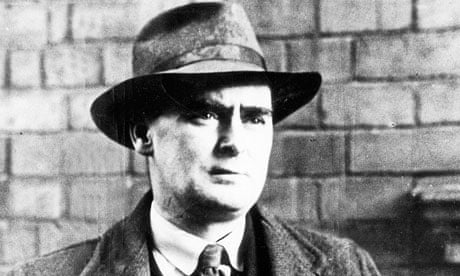My old editions of the novels smell of mushrooms, with that delicious paperback dried-prune top note. I am guided through their familiar landscape by an ancient system of strips of paper, Post-Its, pencil markings and crisp corner-turnings, identifying landmarks and little phrases. "Hell goes round and round. In shape it is circular, and by nature it is interminable, repetitive, and nearly unbearable" (The Third Policeman). "The continual cracking of your feet on the road makes a certain quantity of road come up into you" (The Third Policeman). I wish.
Flann O'Brien, born 100 years ago on 5 October, had a proper job and took his family responsibilities seriously – though as Anthony Cronin points out in his biography No Laughing Matter, in the end he was destroyed by them, "by a too ready acceptance of the necessity of emulating the life pattern of the majority who do not have a special vocation".
He suffered the fate of all comic writers: people don't take you seriously. James Joyce, when he read At Swim-Two-Birds, remarked: "A really funny book." Great writers don't write really funny books. They write great books.
He wrote his best book – At Swim-Two-Birds – first. The TLS called it "as clever as paint". A back-handed compliment. He suffered a lifetime of back-handed compliments. And bad luck. The warehouse containing copies of the novel was bombed. His second novel, The Third Policeman, was rejected by his publisher. His play, Faustus Kelly, flopped in 1943. He descended into journalism. Imagine being remembered for ever for your light-hearted newspaper columns. Imagine: you're better than James Joyce; you end up like Miles Kington.
"'That is about the size of it,' said the sergeant. I felt so sad and so entirely disappointed that tears came into my eyes and a lump of incommunicable poignancy swelled tragically in my throat" (The Third Policeman).
He died on April Fool's Day 1966. The year I was born. You can't choose your family. You can choose your forebears.

Comments (…)
Sign in or create your Guardian account to join the discussion